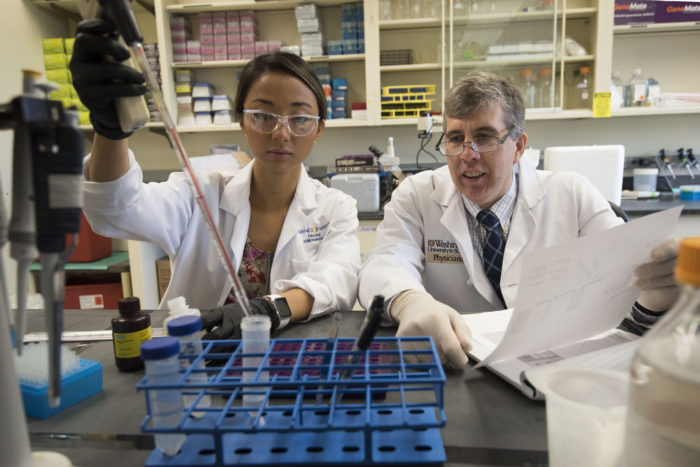$10.4 million awarded for pancreatic cancer research
Federal grant will fund new ways of treating deadliest form of the disease
 Robert Boston
Robert BostonLinda Jin, MD, a general surgery resident, and William Hawkins, MD, a professor of surgery, both at Washington University School of Medicine in St. Louis, work in the lab. Hawkins is principal investigator of a $10.4 million grant aimed at developing new treatments for pancreatic cancer.
The National Cancer Institute (NCI) has awarded a $10.4 million, five-year grant to Washington University researchers and physicians at Siteman Cancer Center to lead a national group of experts in collaborative pancreatic cancer research.
The award, a prestigious Specialized Program of Research Excellence (SPORE) grant, will help scientists pursue new treatments for the deadliest form of the disease, pancreatic ductal adenocarcinoma, including development of more effective chemotherapies and a vaccine.
Partner institutions are the University of Rochester, the University of North Carolina at Chapel Hill and Johns Hopkins University.
“This grant addresses a huge need to improve therapies for pancreatic cancer patients,” said William Hawkins, MD, a Washington University professor of surgery and principal investigator of the grant. “With it, we are able to build on our already extensive knowledge of the disease and to further pursue a multipronged approach aimed at extending lives.”
The pancreas, an organ that lies between the stomach and spine, has two primary functions: making enzymes that are released into the small intestine to help digest food, and making insulin and other hormones that help control blood sugar levels.
While the lifetime risk of developing pancreatic cancer is low – about 1.5 percent for the average American – fewer than 8 percent of patients survive more than five years after they’re diagnosed, according to the NCI. This year, an estimated 53,070 people will be diagnosed with the disease in the U.S., including 1,080 in Missouri and 2,120 in Illinois, according to the American Cancer Society. Surgery, radiation and chemotherapy can extend survival and/or relieve symptoms, but they rarely serve as a cure.
The SPORE grant supports four new projects that involve:
- Altering the environment around the tumor to make it more susceptible to immunotherapy, which harnesses a patient’s own immune system to fight cancer. This research is led by David DeNardo, PhD, a Washington University assistant professor of medicine, who will work with David Linehan, MD, of the University of Rochester;
- Developing a more effective chemotherapy aimed at targeting pancreatic cancer and inducing tumor cell death. This work is led by Hawkins, who also sees patients at Barnes-Jewish Hospital and is the Neidorff Family and Robert C. Packman Professor;
- Evaluating for future clinical testing another potential chemotherapy that overcomes tumor resistance. This area of study is led by Andrea Wang-Gillam, MD, PhD, a Washington University associate professor of medicine, who will work with Channing Der, PhD, of the University of North Carolina at Chapel Hill;
- Conducting preclinical studies of a personalized pancreatic cancer vaccine. This work is led by William Gillanders, MD, a Washington University professor of surgery, who will work with Robert Schreiber, PhD, the Alumni Endowed Professor of Pathology and Immunology at Washington University, and Elizabeth M. Jaffee, MD, of Johns Hopkins University.
Three other Washington University faculty members are key partners: Ryan Fields, MD, an assistant professor of surgery; Graham Colditz, MD, DrPH, the Niess-Gain Professor of Surgery; and Albert Lockhart, MD, a professor of medicine.
The award is the second SPORE grant currently held by Washington University researchers. The other, a $11.3 million, five-year award given in 2013, is for leukemia research.






